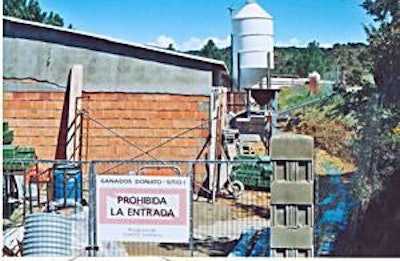
Spanish pig producers Juan Carlos and Ramon Donato are weighing their options and may cease production because of the European Union rule on gestation crates. In 2013, all sows according to EU regulations will have to “go loose” during the gestation period, that is, no longer be raised in crates.
Currently, it is most likely that only 10% of sows in Spain can be said to comply with this regulation compared to 50% in the northwestern part of Europe.
Typical Spanish producers
Together, the two brothers own a 25-acre farm with about 360 sows located a few km outside of Benabarre, approximately 200 km west of Barcelona. Juan Carlos and Ramon are typical of many medium-sized pig-producers in Spain. They do most of the work themselves, including repair and maintenance, and they have a contract with a company that owns the sows.
The company supplies the feed, medicine, semen and all other products which are needed. The owner is responsible for maintaining the buildings, pays the electricity and water, and is paid for each piglet.
The company moves the piglets at the age of around 26 days (the new regulation says 28) and the producer is paid a little over € 10 for each piglet.
“If they can walk we get paid,” so it is the number that counts. At the moment, the brothers average about 12 pigs per sow per weaning.
Company supplies gilts
The company supplies the new breeding gilts, which are Landrace and Duroc, at around 25 kg, and every third week on Monday and Tuesday they receive Pietrain semen for insemination.
Usually, they help each other with the insemination and have two Yorkshire boars for chaser to speed up the work. Then on Wednesday, Ramon collects semen from their own Pietrain boars in case some come into heat later.
“This helps us to get a higher conception rate,” he explains. It is clear that this is a farm where things don’t look fancy, but where small things are taken care of for a good return.
All sows in the farrowing pens are fed by hand, and the piglets in their first days are bedded on shredded newspaper. Many things on this farm are made in a practical manner, rather than just for looks.
For example, the roof is sprayed with polythene for insulation to prevent condensed water from dripping down. Every 10 meters one slot is removed behind the gestation sows and a piece of steel is placed on top, which can easily be removed for cleaning.
Curtains are manually hoisted up to give plenty of ventilation during the hottest period of summer. The brothers have been thinking about installing a ventilation system in the farrowing stables, along with some kind of spraying system but, to date, there have been no EU rules making such demands.
2013 a long ways off
“The year 2013 is a long way ahead and, who knows, maybe we will get a postponement of the law requiring that gestating sows go loose, so we will have to wait and see,” says Juan Carlos. “If we have to change, we will, perhaps, like thousands of other farmers, stop our pig production and try to find a job.”
After talking to the two farmers it is clear that they know their business and manage to survive in a difficult market situation.
With total production of 9,000–9,500 piglets at €10 each, the profit for the two owners is not high, when costs for electricity, water and general maintenance are deducted, but compared to many farmers in other countries they are not losing money.



(1).jpg?auto=format%2Ccompress&fit=crop&h=167&q=70&w=250)













